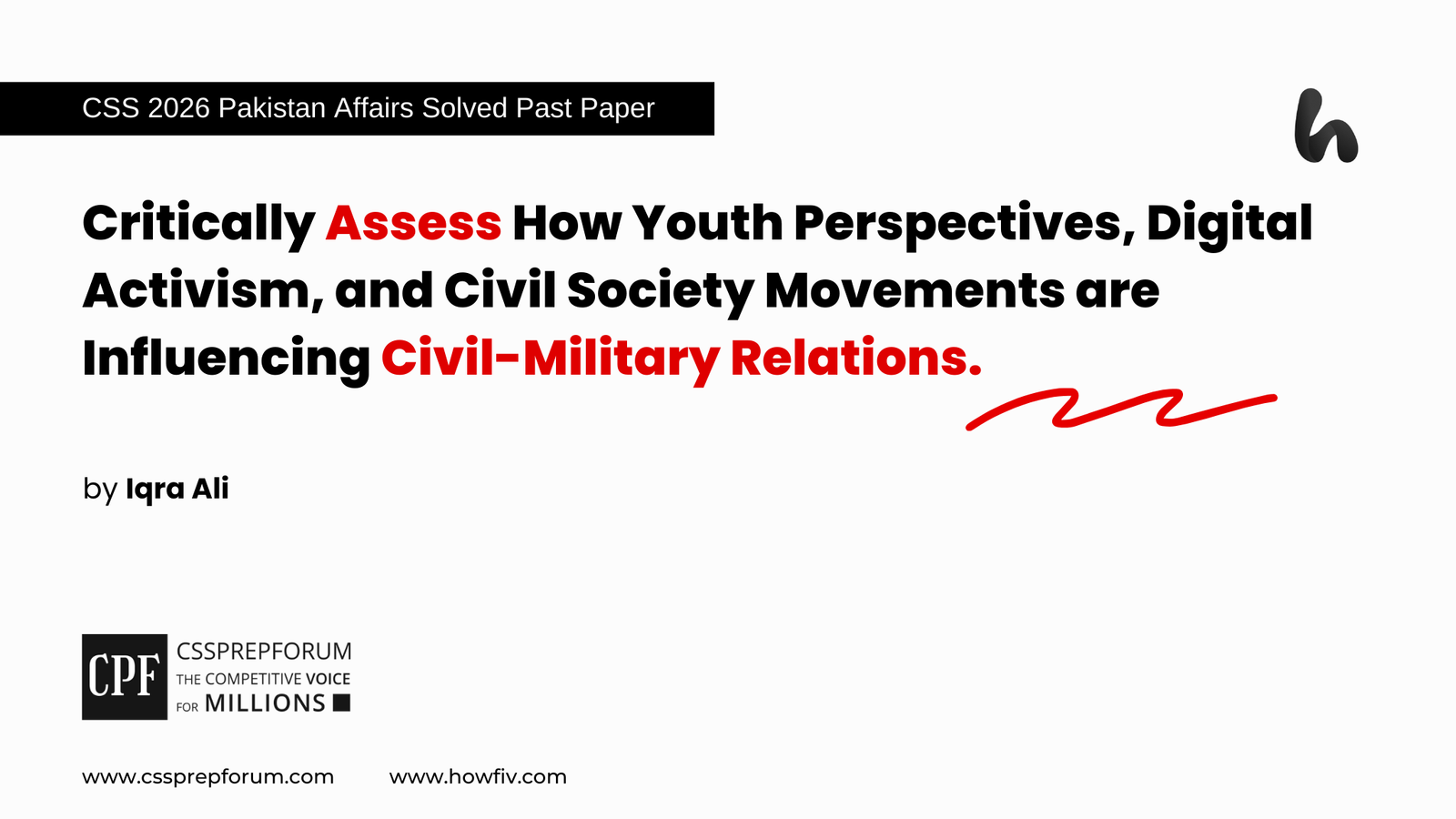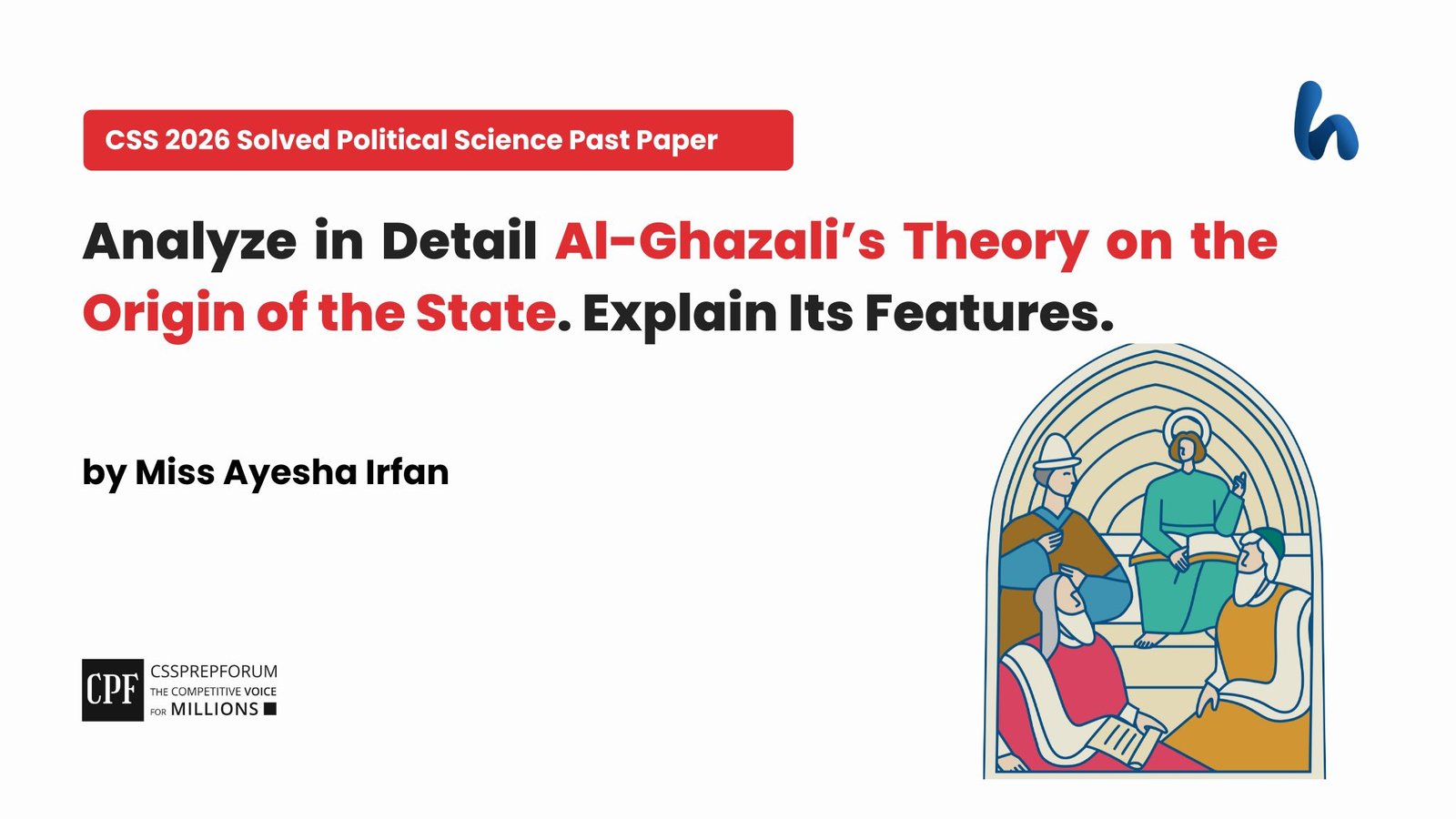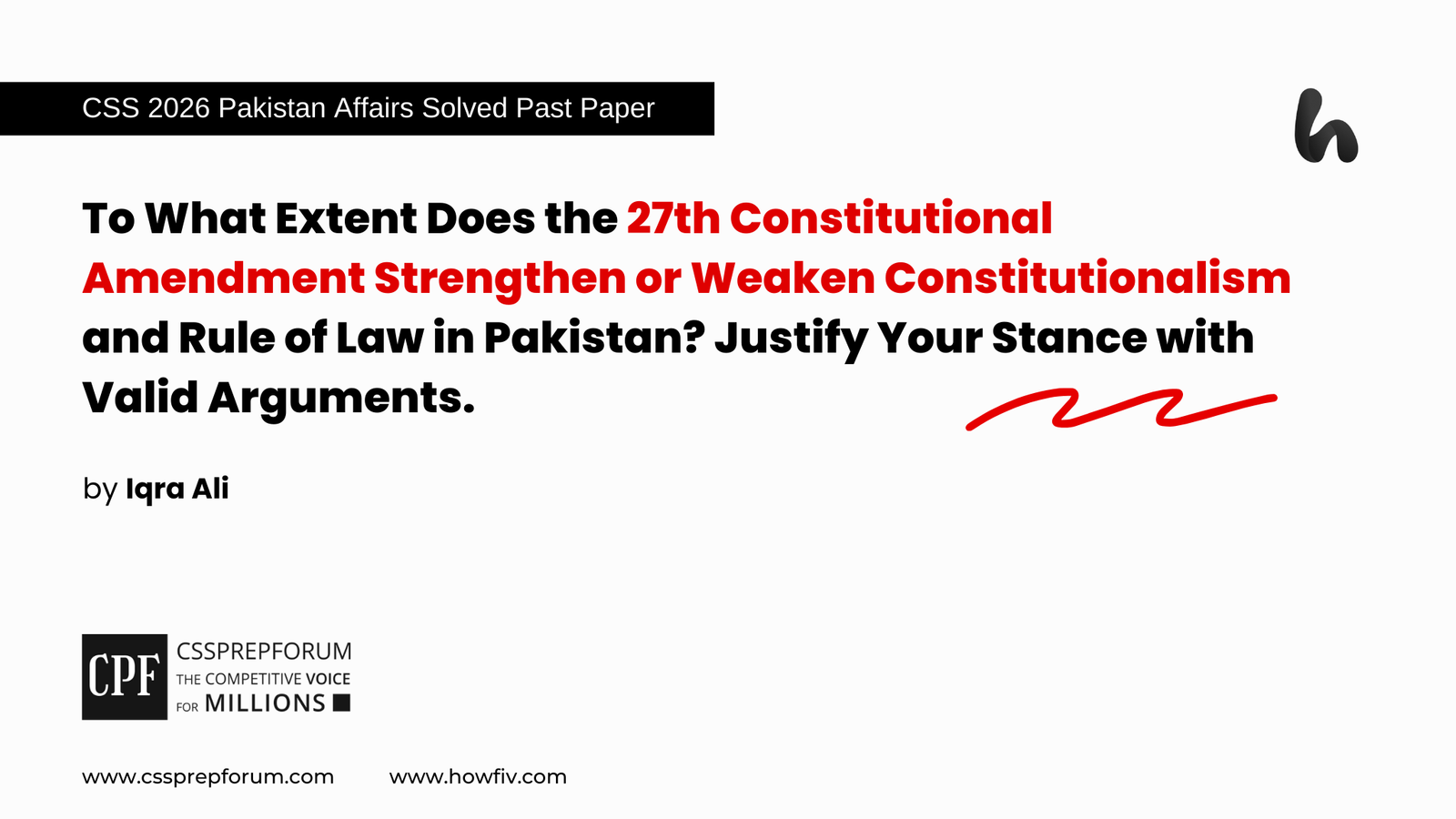The following article, “National Integration in Pakistan“, is written by Mahad Zulfiqar, a student of Sir Syed Kazim Ali. Moreover, the article is written on the same pattern, taught by Sir to his students, scoring the highest marks in compulsory subjects for years. Sir Kazim has uploaded his students’ solved past paper questions so other thousands of aspirants can understand how to crack a topic or question, how to write relevantly, what coherence is, and how to include and connect ideas, opinions, and suggestions to score the maximum.

Outline
1- Introduction
National integration is the centripetal social force that cultivates a sense of commonality among individuals. It holds immense significance for a country like Pakistan, which embraces a rich tapestry of cultures, languages, religions, and ethnicities. Within the context of Pakistan, political instability and linguistic diversity, sectarianism and religious extremism, and political instability and socioeconomic disparities are at the top of the problems. However, Pakistan can achieve stability, progress, and prosperity by embracing diversity, promoting tolerance, and ensuring equal opportunities for all.
2- Importance of national integration in Pakistan
3- Hurdles in the way of achieving national integration in Pakistan
- ✓Ethnic and linguistic diversity
- ✓Sectarianism and Religious Extremism
- ✓Political instability
- ✓Socioeconomic Disparities
4- Ways forward to achieve national integration in Pakistan
- ✓Education and awareness
- ✓Equal rights and Social Justice
- ✓Inter-Provincial harmony
- ✓Media and communication
5- Conclusion

Answer to the Question
Introduction
National integration is the centripetal social force that cultivates a sense of oneness among individuals. It assumes paramount importance for a country like Pakistan, a nation that embraces a rich tapestry of cultures, languages, religions, and ethnicities. National integration fosters citizens’ sense of belonging and patriotism, promoting understanding and tolerance among diverse communities. However, the challenge of national integration in Pakistan is deeply rooted in the country’s history. Ethnolinguistic diversity poses a significant hurdle as various ethnic groups with distinct languages, cultures, and traditions coexist within the nation. Sectarianism and religious extremism further complicate the pursuit of national integration. Moreover, acts of violence, intolerance, and extremism perpetrated in the name of religion have eroded the sense of national identity and cohesion. Political instability is another formidable challenge. Pakistan has endured political instability throughout history, marked by frequent government changes, weak democratic institutions, and power struggles. These factors impede the development of a cohesive national narrative. Socioeconomic disparities and unequal distribution of resources perpetuate feelings of marginalization and alienation among different regions and communities. The lack of equal opportunities, economic development, and social justice fuels grievances and a sense of inequality, hindering efforts to foster national integration. Despite these challenges, there are promising prospects for achieving national integration in Pakistan. Promoting education that encourages tolerance, inclusivity, and respect for diversity is crucial. In addition, encouraging dialogue and highlighting different communities’ shared heritage and values can also bridge gaps and build a sense of belonging. Furthermore, ensuring equal rights and opportunities for all citizens, regardless of their ethnic, linguistic, or religious backgrounds, is vital for national integration. In essence, national integration in Pakistan is an ongoing process that demands a collective effort from all segments of society. This article focuses on the importance of national integration, hurdles in the way of achieving it, and some suggestions to promote it in Pakistan.
Importance of National Integration in Pakistan
National integration is an indispensable element for Pakistan, a diverse nation encompassing a myriad of ethnicities, languages, and cultural backgrounds. It is the bedrock for a unified and harmonious society, fostering social cohesion, stability, and progress. Pakistan’s strength lies in its capacity to embrace diversity and forge a collective identity that transcends individual distinctions. First, national integration cultivates citizens’ profound sense of belonging and patriotism. It instils a shared pride in the nation’s rich history, culture, and achievements, nurturing a collective consciousness that unites individuals beyond their regional or ethnic affiliations. This unity of purpose bolsters national solidarity and resilience in adversity. Second, national integration promotes mutual understanding and tolerance among diverse communities. It encourages recognizing and appreciating varying perspectives, fostering a spirit of inclusivity and respect for one another. By celebrating cultural diversity, Pakistan can harness its traditions, languages, and customs richness to create a vibrant and pluralistic society. Furthermore, national integration is crucial for cultivating peace and stability. It helps overcome sectarian, ethnic, and linguistic divisions, mitigating potential conflicts and fostering an atmosphere of harmony and coexistence. Pakistan can build bridges of understanding by promoting interfaith dialogue and cultural exchange, reinforcing its commitment to religious tolerance and social harmony.
Hurdles in the way of establishing National Integration in Pakistan
Ethnic and linguistic diversity
Pakistan’s rich ethnic tapestry comprises various groups, including Punjabis, Sindhis, Balochis, Pashtuns, and Mohajirs, each with distinct language, culture, and traditions. While this diversity is a source of strength, it has also posed challenges in fostering a unified national identity. Ethnic divisions, linguistic barriers, and regional disparities have, at times, fueled tensions and conflicts that hinder national integration.
Sectarianism and Religious Extremism
Religious diversity is another salient aspect of Pakistan’s social landscape. However, the surge of sectarianism and religious extremism has exacerbated divisions among different sects and religious communities. Acts of violence, intolerance, and extremism perpetrated under the guise of religion have eroded the sense of national identity and cohesion, making it imperative to address these challenges for national integration.
Political instability
Pakistan has grappled with periods of political instability throughout its history. Frequent changes in governments, weak democratic institutions, and power struggles have impeded the development of a cohesive national narrative. Political instability often prioritizes individual or group interests over national interests, leading to a fragmented society and hindering national integration.
Socioeconomic Disparities
Socioeconomic disparities and unequal distribution of resources have exacerbated feelings of marginalization and alienation among different regions and communities. The absence of equal opportunities, economic development, and social justice has fueled grievances and fostered a sense of inequity, hindering efforts to cultivate national integration.
Way forward to create National integration in Pakistan
Education and Awareness
Promoting education that fosters tolerance, inclusivity, and respect for diversity is crucial for achieving national integration. Encouraging dialogue and highlighting different communities’ shared heritage and values can help bridge the gaps and build a sense of belonging.
Equal rights and Social Justice
Next, ensuring equal rights and opportunities for all citizens, regardless of ethnic, linguistic, or religious background, is paramount for national integration. Implementing policies that address regional disparities and promote social justice can help alleviate grievances and foster unity.
Inter-Provincial harmony
Encouraging collaboration and cooperation among different provinces is crucial for national integration. Pakistan can bolster its unity by promoting inter-provincial cultural exchanges, economic cooperation, and political dialogue, fostering a sense of shared destiny.
Media and communication
The media plays a pivotal role in shaping public opinion and fostering national integration. Responsible journalism, promoting positive narratives, and highlighting stories celebrating diversity can help build bridges and reduce prejudices.
Conclusion
National integration in Pakistan is an ongoing process that demands a concerted effort from all segments of society. Surmounting the challenges of ethnolinguistic diversity, regional disparities, sectarianism, and political fragmentation is essential for fostering unity and cultivating a robust national identity. Pakistan can pave the way for national integration and build a prosperous future for its citizens by championing education, equal rights, inter-provincial harmony, and responsible media. Individuals, communities, and the government must work in unison, embracing diversity as a source of strength and nurturing a shared identity rooted in mutual respect and understanding. Pakistan can only harness its full potential and overcome the obstacles that hinder progress and prosperity through national integration.

CSS Solved Past Papers’ Essays
Looking for the last ten years of CSS and PMS Solved Essays and want to know how Sir Kazim’s students write and score the highest marks in the essays’ papers? Then, click on the CSS Solved Essays to start reading them.
CSS Solved Essays
CSS Solved General Science & Ability Past Papers
Want to read the last ten years’ General Science & Ability Solved Past Papers to learn how to attempt them and to score high? Let’s click on the link below to read them all freely. All past papers have been solved by Miss Iqra Ali & Dr Nishat Baloch, Pakistan’s top CSS GSA coach having the highest score of their students. General Science & Ability Solved Past Papers
Articles Might Interest You!
The following are some of the most important articles for CSS and PMS aspirants. Click on any to start reading.











